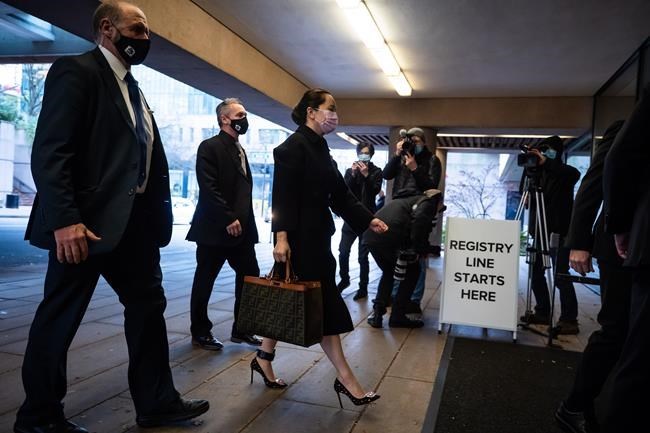VANCOUVER — An RCMP officer who was tasked as a point person for U.S. investigators during the 2018 arrest of Meng Wanzhou at Vancouver's airport says he didn't see himself as working for them.
Sgt. Ross Lundie told the B.C. Supreme Court on Monday that he updated the Federal Bureau of Investigation when the Huawei executive was arrested but he didn't see anything wrong with that.
"At the end of the day, I'm not there to provide information or act on behalf of the FBI," Lundie said. "I'm there working as an RCMP member."
Meng returned to court Monday for the evidentiary hearing in her extradition case after a media report last week said the U.S. Justice Department is discussing a deal in her case.
The Wall Street Journal reported that American prosecutors were discussing a deferred prosecution agreement with Meng that would see her admit to some level of wrongdoing and allow her to leave Canada.
Prime Minister Justin Trudeau wouldn't comment on the report Friday, except to say Canada's absolute priority is the safe release of Michael Kovrig and Michael Spavor, whose arrests in China have been widely linked to Canada's detention of Meng.
Meng is wanted in the United States on charges of fraud and conspiracy based on allegations that she misrepresented Huawei's relationship with subsidiary Skycom in a 2013 presentation to HSBC, putting the bank at risk of violating U.S. sanctions against Iran.
Meng and Huawei both deny the allegations.
There was no mention of the talks in court on Monday as witness testimony resumed.
Court has heard that Lundie was a senior officer in a satellite RCMP office at Vancouver's airport and had previously worked for a national security team that brought Mounties together with Canada Border Services Agency officers and other investigators.
He told the court he offered to work on his day off when Meng was arrested to ensure things went smoothly. He suggested the border agency complete its customs and immigration process before the arrest because he didn't want to step on the organization's toes.
Richard Peck, one of Meng's lawyers, read an email from a senior Mountie that identified Lundie as an RCMP contact for the FBI.
Lundie agreed that was true but said he never saw himself as a lead on the case, only as assisting the unit tasked with Meng's arrest.
"Assisting the FBI, given my background and what I'm used to, this is a very uncomfortable position to be in. This is not what we do," Lundie said.
"But you did," Peck said.
Lundie agreed that he communicated with the FBI that day.
Lundie has testified that in his previous role with the national security team, it was normal to work with other investigative units, but his duties changed when he moved to the Richmond detachment, which operates the satellite office at the airport.
"I'm in a different role here. I worked for a detachment, so that's different," he said.
Peck asked him if he had any concerns about the information he shared with the FBI.
"I didn't pass information I shouldn't have."
Meng's lawyers are seeking evidence through the hearings to support an abuse of process claim. They allege that the RCMP and border officers conducted a covert criminal investigation at the behest of U.S. authorities under the guise of a routine immigration exam.
Lundie told the court that during a meeting between the border agency and RCMP officers before Meng's arrest, he spoke about a legal avenue through which the RCMP could request information related to a border exam.
Peck asked why he would raise a way of sharing information if he had no intention to glean what was learned from the exam.
"My intent was to tell them not to interfere at all," Lundie said.
The border exam ultimately took almost three hours and Peck asked Lundie if he was concerned by the time it was taking.
"I understand the optics of it taking as long as it did. It would have been better if it had not. But no, no I didn't," Lundie said.
Peck challenged Lundie on the purpose of the border exam.
"This exam by the CBSA, I suggest to you, was orchestrated to gain information from her," Peck said.
"No," Lundie replied.
Peck suggested the content of the exam could be shared later through the legal mechanism Lundie raised with officers earlier that day. And the information would be of interest to the FBI, not the RCMP, Peck said.
"No," Lundie said.
This report by The Canadian Press was first published Dec. 7, 2020.
Amy Smart, The Canadian Press




